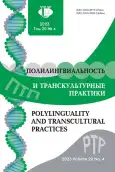Morphological Features of Russian Speech of Two Generations of Bilinguals and Monolinguals
- 作者: Belyaeva A.P.1, Moskovkin L.V.1, Tskhovrebov A.S.1
-
隶属关系:
- Saint Petersburg State University
- 期: 卷 20, 编号 4 (2023)
- 页面: 636-649
- 栏目: Language in System
- URL: https://journal-vniispk.ru/2618-897X/article/view/326668
- DOI: https://doi.org/10.22363/2618-897X-2023-20-4-636-649
- EDN: https://elibrary.ru/MHQNLY
- ID: 326668
如何引用文章
全文:
详细
The purpose of the study is to analyze the morphological features of the Russian speech of two generations of Russian-German bilinguals living in Germany and Russian monolinguals living in Russia. The relevance of this study is due to the need to study the state of the Russian language abroad, its preservation and development. Four groups of informants took part in the study: 22 bilingual adults, 26 their children, 19 monolingual adults, 23 their children. The age of the parents is 35-50 years, the age of the children is 10-15 years. The material of the study was transcripts of audio recordings of oral stories based on pictures from the book by M. Mayer “Frog: where are you?”. Research methods are directed sampling, descriptive, systematization, statistical and comparative. Deviations from morphological norms were grouped into two structural types: 1) deviations from the norms of constructing word forms; 2) deviations from the norms of the choice of word forms. The study determined the average number of deviations from morphological norms in the stories of four groups of informants. It was found that in families seeking to preserve the Russian language in conditions of emigration, the morphological system remains relatively stable. At the same time, the average proportion of deviations from morphological norms in the speech of bilinguals is higher than in the speech of monolinguals, and in the speech of children is higher than in the speech of their parents. The average values of the number of typical deviations from the norms in each of the groups were determined. The heterogeneity of the number of deviations from the norms in individual representatives of each of the groups of informants was revealed. It is established that in some families the literary language is preserved, and the influence of the German language is not revealed, in others the vernacular is the means of communication, and some deviations from morphological norms may be caused by interlanguage interference. It should be noted that the greatest difficulty for all native speakers of the Russian language is the norms of the use of case forms and prepositional-case.
作者简介
Anastasia Belyaeva
Saint Petersburg State University
Email: nas97erm@gmail.com
ORCID iD: 0000-0002-7418-8507
laboratory assistant-researcher, Faculty of Philology
7/9 Universitetskaya Lane, Saint Petersburg, 199034, Russian FederationLeonid Moskovkin
Saint Petersburg State University
Email: l.moskovkin.leonid@yandex.ru
ORCID iD: 0000-0002-4818-1205
Doctor of Pedagogical Sciences, Professor of the Department of Russian as a Foreign Language and Methods of Teaching It
7/9 Universitetskaya Lane, Saint Petersburg, 199034, Russian FederationAlan Tskhovrebov
Saint Petersburg State University
编辑信件的主要联系方式.
Email: alanec1985@mail.ru
ORCID iD: 0000-0002-5199-1460
Candidate of Pedagogical Sciences, Associate Professor of the Department of Russian as a Foreign Language and Methods of Teaching It
7/9 Universitetskaya Lane, Saint Petersburg, 199034, Russian Federation参考
- Tseitlin, S.N. 2009. Essays on word formation and form formation in children’s speech. Moscow: Znak publ. Print. (In Russ.).
- Voeikova, M.D. 2015. Formation of a name: early stages of mastering the nominal morphology of the Russian language by children. Moscow: YaSK: Foundation for the Development of Fundamental Linguistic Research. Print. (In Russ.).
- Gagarina, N.V. 2008. Formation of grammatical categories of the Russian verb in children’s speech. St. Petersburg: Nauka publ. Print. (In Russ.).
- Dulay, H., and M. Burt. 1973. Should we teach children syntax? Language Learning 23: 245–258.
- Bailey, K., Madden, C., Krashen, S. 1974. Is there a “natural sequence” in adult second language learning? Language Learning 21: 235–243.
- Larsen-Freeman, D. 1976. An explanation for the morpheme acquisition order of second language learners. Language Learning 26: 125–134.
- Panov, M.V. 1989. Work on morphological errors. In Panov, M.V., Sukunov, Kh.Kh., Ekba, N.B. Phonetic, morphological and syntactical errors in the Russian speech of students of national schools. Moscow: Research Institute of National Schools of the Ministry of Education of the RSFSR. Pp. 42–110. (In Russ.).
- Tseitlin, S.N. 2009. Grammatical errors in the development of the Russian language as a first and as a second. Questions of psycholinguistics 9; 43–53. (In Russ.).
- Akhnina, K.V. 2015. Grammatical errors of bilingual students in medical discourse. Polylinguality and transcultural practices 5: 145–148. (In Russ.).
- Krutikova, A.Yu. 2021. Interference morphological errors in the speech of Russian-Tajik bilinguals. Science and education today 4 (63): 64–68. (In Russ.).
- Polinsky, M. 2008. Gender under incomplete acquisition: Heritage speakers’ knowledge of noun categorization. Heritage Language Journal 69 (1): 40–71.
- Laleko, O. 2018. What is difficult about grammatical gender? Evidence from heritage Russian. Journal of Language Contact 11 (2): 233–267.
- Lemmerth, N., Hopp, H. 2019. Gender processing in simultaneous and successive bilingual children: Cross-linguistic lexical and syntactic influences. Language Acquisition 26 (1): 21–45.
- Janssen, B.E. 2016. The acquisition of gender and case in Polish and Russian: A study of monolingual and bilingual children. thesis. Amsterdam: Pegasus.
- Anstatt, Т. 2008. Aspect and tense in storytelling by Russian, German and bilingual children. Russian Linguistics 32: 1–26.
- Anstatt, Т. 2008. Aspektfehler im russischen mono- und bilingualer kinder. Deutsche Beiträge zum 14 Internationalen Slavistenkongress Ohrid 2008. München: Sagner. Pp. 13–25/
- Laleko, O. 2011. Restructuring of Verbal Aspect in Heritage Russian: Beyond Lexicalization. International Journal of Language Studies 5 (3): 13–26.
- Mikhailova, A. 2011. Interaction of Aspectual Morphology in L2 and Heritage Russian. In Granena G. et al. (eds.) Selected Proceedings of the 2010 Second Language Research Forum. Somerville, MA: Cascadilla Proceedings Project. Pp. 63–77.
- Sergeev, F.P. 2010. Speech errors and their prevention. Volgograd: Teacher Publ.
- Sichinava, D.V. 2019. Slavic pluperfect: spaces of possibilities. Questions of linguistics 1: 30–57. (In Russ.).
- Tseitlin, S.N. 1997. Speech errors and their prevention. Moscow, Librokom Book House. (In Russ.).
补充文件









